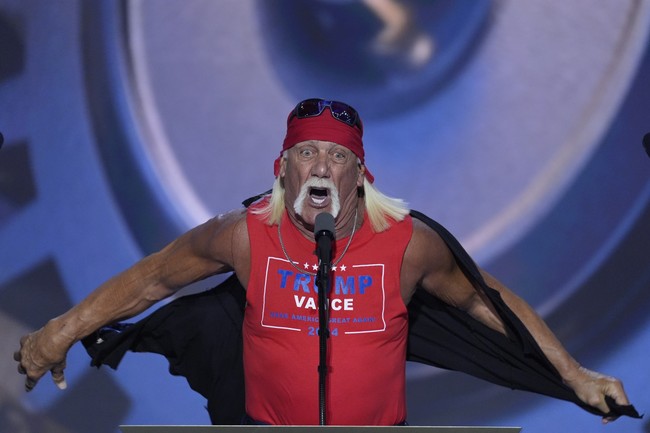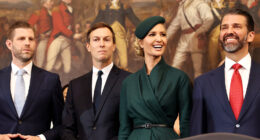
When Robert Rudolph Remus changed his name to Sgt. Slaughter and adopted the persona of a psycho Marine drill instructor, he developed one of the greatest, most memorable characters in pro wrestling history. GI Joe even modeled a toy after him.
But Remus never served in the military. For years, he lied about being in the Marines and fighting for his country in the Vietnam War: It was all just a gimmick.
(I know, I know: It’s like finding out Santa Claus isn’t real all over again.)
Wanna know something else? “The Russian Bear” Ivan Koloff wasn’t actually from Russia. (Gasp!) He was actually a Canadian dude named Oreal Donald Perras. For a short while, Perras pretended to be an Irish villain named Red McNulty; when that gimmick ran out of steam, he grew a beard, shaved his head, and became the evil Soviet madman Ivan Koloff — the man who finally defeated the legendary Bruno Sammartino.
Before there was a Kamala Harris the Frisco district attorney, there was a Kamala the Ugandan Giant who was really just a large black guy (billed as 6 ft. 7, 380 pounds) from Senatobia, Miss. (Weirdly, the last name of the original Kamala was also Harris: James Arthur Harris.)
If you hate pro wrestling, this is the part that drives you batty: It’s a bunch of lies — mixed with a heavy helping of utter nonsense — marketed to the masses. It’s clearly a bait-and-switch: You’re pretending this “sport” is one thing, when it’s actually something else. And YES TIMES A MILLION: IT IS FAKE!
But if you love pro wrestling, this is exactly what makes it so magical: How the hell did this fictional “sport” — featuring made-up characters doing the silliest, wackiest shenanigans imaginable — ever generate such passionate fandom?
Even Jerry Seinfeld was flummoxed. “If professional wrestling did not exist, could you come up with this idea?” he wondered. “Could you envision the popularity of huge men in tiny bathing suits, pretending to fight?”
But make no mistake, this fake sport makes real money. The WWE (World Wrestling Entertainment) has 90 million fans in the United States alone.
They also have a market capitalization of $8.37 billion. The WWE just signed a blockbuster deal with Netflix for $5 billion. It’s one of the most highly-valued entertainment properties in the entire world. Its stars include the top draws in Hollywood: “The Rock” Dwayne Johnson, John Cena, and David Batista. Retired stars like Steve Austin, Ric Flair, and the Undertaker are still commanding the spotlight; Hulk Hogan just addressed the Republican National Convention in primetime.
This is Big Boy economics.
Why does it work so well? And will its “tricks of the trade” for evoking emotional responses translate to politics?
It’s probably worth noting that a very large percentage of pro wrestlers are hardcore Republicans. Kane, who played the brother of the Undertaker, is now the (Republican) Knoxville Mayor Glenn Jacobs. JBL (John Layfield) portrayed an ornery cowboy on WWE television, but he is a savvy financial planner who’s made hundreds of appearances on FOX News and FOX Business. The Undertaker (Mark Calaway), Road Dogg (Brian James), and Chris Jericho all donated money to Trump. Ric Flair and Hulk Hogan have openly campaigned for MAGA. Linda McMahon, the former president, CEO and co-owner of the WWE, served in President Trump’s cabinet.
And President Trump, of course, is a member of the WWE Hall of Fame.
The skill-set of a successful pro wrestler includes the traits that most politicians would kill for: Visually, you need to stand-out and draw eyeballs. (Being handsome is a plus, but at a minimum, you need an aura — a natural presence.) Orally, you must be able to deliver a great promo at the drop of a hat. Theatrically, you’ve gotta be believable when you play the part. And substantively, you need a sixth sense to anticipate the kind of storytelling that will excite your audience, keep ‘em entertained — and (knock on wood) continue to motivate ‘em to spend money on your merch, your tickets, and your shows.
Back in the territory days of wrestling, it wasn’t uncommon for a wrestler to spend 300+ days on the road each year. That was your profit-model: You were paid when you performed, and the measuring stick was the audience gate. During the 1980s, cable television nationalized the wrestling industry, and by the 1990s, promoters were using their weekly shows to upsell monthly Pay-Per-Views. Today with Netflix, it looks like the industry is migrating yet again, this time to streaming.
That’s another commonality between wrestling and politics: Both must be agile enough to pivot whenever market conditions change. Neither can be married to the old ways — that “where’s my cheese?” mentality. You almost need the mindset that your audience is comprised of traitorous, disloyal, ADD-addled Karens: If you don’t give ‘em what they want and keep ‘em happy, they’ll drop you in a New York minute. Their previous loyalty means nothing; they owe you zero allegiance. Instead, it’s your job to retain them.
They share similar gimmicks and story angles: Good guys versus bad! The hometown hero over the arrogant foreigner! After the Trump-Harris presidential debate, ABC News was baffled when Kamala Harris failed to get a bigger bounce. Well, any wrestling fan could tell you why: ABC and Kamala were doing that double-teaming gimmick, where anchors David Muir and Linsey Davis kept jumping in, helping Harris attack Trump while the “referee” was somehow oblivious to the lack of fairness.
(Silly Democrats! That gimmick is supposed to get heat on the bad guys — not make the audience sympathetic to them.)
There’s also a curious tribal element to both “sports”: There’s chanting, role-playing, music, lights, and (manufactured) drama. And perhaps most intriguing, both depend on audience interaction. The hotter the crowd, the better the show. In a strange way, it’s as much about us as it is about them.
The other rule is that there are no rules. Over the years, there have been hugely popular wrestlers of every size, shape and incarnation imaginable. Visually, when you go from Andre the Giant to Ric Flair to Booker T to Rey Mysterio to Yokozuna to Mick Foley to Dusty Rhodes to the Road Warriors, you’re not going to see much in common. They all differed considerably in almost every aspect of their presentation!
Yet they all drew millions. They were all world champions. They were all enormously successful, money-generating superstars.
It’s the same with politics: They’re outcome-based enterprises. The only litmus test is victory. And you’ve gotta be able to do it your own unique way.
As the barriers between entertainment media further disintegrate, we’re going to see more wrestlers taking the plunge into politics. Dwayne Johnson has flirted with the idea, and in 1998, ex-wrestler Jesse Ventura was elected governor of Minnesota as a member of the Reform Party (Ventura endorsed Harris in 2024). Any stigma that “wrasslin’” once had has dissipated, and with social media providing wrestlers with a platform to promote their own views, it’s never been easier to leverage your WWE fame and fortune into a new career in Washington, DC.
Gimme a “Hell Yeah!”
So what’s the bottom line for wrestling and politics? You play a character, sell a story, work a crowd, get heat on your enemies, and keep your audience salivating for more.
Nothing fake about that.




